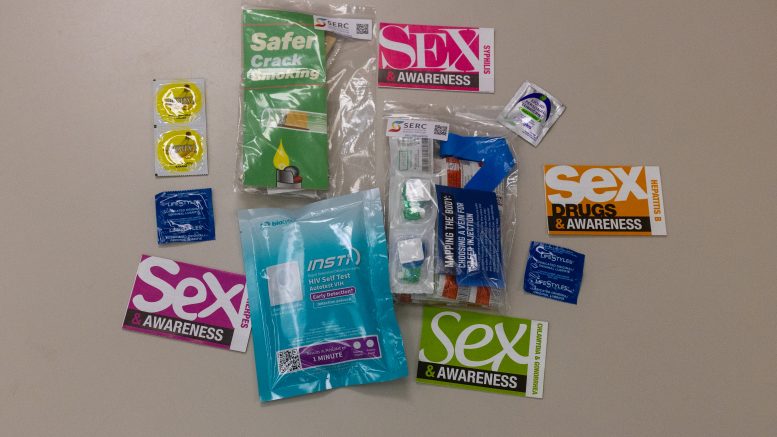The Student Wellness Centre (SWC) and Rainbow Pride Centre (RPC) are collaborating on an interactive workshop on harm reduction this Friday.
The event will feature a panel discussion aiming to challenge myths surrounding harm reduction, followed by a lesson on how to make a harm reduction kit.
SWC assistant Lizzie Magaji called collaborating with RPC on the event “a no-brainer,” pointing out that RPC already provides information and other resources on harm reduction, particularly for 2SLGBTQIA+ students.
“I think when talking about harm reduction, it’s very important to get a diverse array of perspectives to add to the dialogue,” she said.
Alex Rana, UMSU 2SLGBTQIA+ representative and co-president of RPC, said SWC reached out to collaborate on the event. He noted that while RPC had offered safe sex workshops in the past, it had not “had the opportunity to do anything on harm reduction specifically yet,” a space he thought needed to be filled.
“A lot of students do use substances, and abstinence-based education is not really good enough to ensure that people are using things safely and acknowledge the reality that people do use these,” he said.
Magaji said many harm reduction programs are “not explicitly geared towards students and the substances that they commonly use.”
“Of course students can go out to these community services and use the services that they provide, but here we have the data to know what substances and behaviours that students commonly engage in.”
She noted that many students are living on their own for the first time.
“We have a lot of new adults at the university who are able to access substances a lot easier than they could have in the past,” she said.
“We think it’s really important to provide information for those students about the substances that they may want to engage in.”
Rana said a big problem the 2SLGBTQIA+ community faces is negative myths and stereotypes that interfere with education about safer sex, and said sex education often is not inclusive.
“A lot of things they teach about safer sex don’t use inclusive languages,” he said.
Rana said educators often focus on “one type of sex” and that “people who don’t fall into that just don’t learn what they need to,” he said.
The harm reduction kits will contain educational materials and items including internal and external condoms, lubricant, safer substance use supplies and electrolyte packets.
Rana will be one of the speakers for the panel on Friday, sharing experience with harm reduction he has gained from his job and his role as a member of the Safer Social Events team.
The panel will also feature community addictions worker Maireke Veldhuis to discuss myths surrounding substance use and harm reduction and how the risks of certain behaviours may vary for people with different identities.
Magaji called harm reduction “an approach or a strategy that can be fit into a lot of different prospective careers.”
“Of course, we have the somewhat obvious ones like health care, but really any career where you are dealing with the community at large, you can use harm reduction strategies or a harm reduction approach when engaging with people,” she said.
The workshop will take place at 1 p.m. at the Student Wellness Centre.
To register for this workshop, students should email [email protected].


